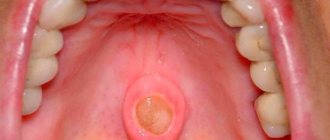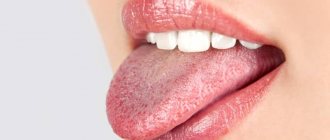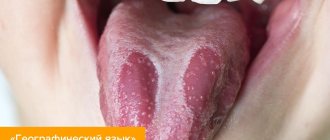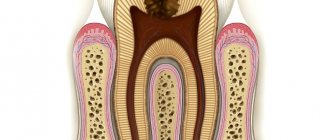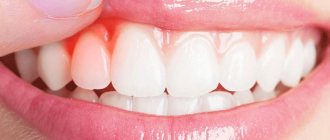Content:
- Why does 1.1 occur? Infectious lesions of mucous membranes 1.2. Injuries as a provocateur of illness 1.3. Poor oral hygiene is a contributing factor to problem 1.4. Diseases of the gastrointestinal tract are the culprits of stomatitis 1.5. Stomatitis as a symptom of helminthic infestation 1.6. Allergy is the cause of illness 1.7. Intoxication causes illness
- Classification
- Symptoms
- How to treat 4.1. Features of treatment of stomatitis
Tongue stomatitis is a dental disease in which the mucous membranes become inflamed. It is dangerous because it is prone to recurrence and sometimes becomes chronic. Children most often suffer from the pathology, but in 20% of cases it is diagnosed in adults.
Glossitis
This pathology is a type of stomatitis. Manifests itself as an infectious inflammation of the mucous membrane of the oral cavity and tongue. The disease most often develops against the background of a variety of reasons that were listed earlier, and is manifested by a variety of symptoms.
Without therapy, the situation will only get worse, so it is better to visit a doctor for advice.
Why does it occur
Stomatitis on the tongue is caused by bacteria, viruses, and fungi that live in the oral cavity. These can be pathogenic and conditionally pathogenic microorganisms that begin to actively multiply as a result of decreased immunity or jaw injuries.
Any person has a huge number of bacteria on the mucous membranes of the tongue. Under normal conditions, they do not cause harm and do not cause any complications. This is due to the fact that saliva contains a special antiseptic component - lysozyme, which does not allow bacteria to actively spread.
With a decrease in the body's defenses and trauma to the tissues of the tongue, infection occurs. Lysozyme ceases to cope with the function of suppressing bacterial and viral agents. Then wounds appear that do not heal for a long time.
Infectious lesions of the mucous membranes
The human tongue is an ideal place for bacteria and viruses to multiply. But saliva exhibits harmful activity and does not allow the latter to spread. If the salivary glands do not function at full capacity, the content of harmful organisms increases. This happens with diabetes, dysbiosis, and severe dehydration.
If there are too many bacteria, a white or yellowish coating forms on the tongue. Soon, ulcers of an infectious nature form. Bubbles can also form, which burst and merge with each other, turning into voluminous painful erosions.
Injuries as a provocateur of illness
In some people, stomatitis is a consequence of constant trauma to the membranes of the mouth from the braces. Damage can also be a consequence of an incorrect bite - for example, if, due to an anomaly, a person very often bites the tip of his tongue.
It has been noticed that the disease more often develops in people who eat solid foods that have sharp edges (lollipops, crackers, etc.). Injury to mucous membranes and broken crowns of teeth.
Poor oral hygiene is a contributing factor to the problem.
More often, people who do not pay due attention to oral hygiene need treatment. Typically, they rarely brush their teeth, do not undergo routine dental examinations, and do not use dental floss or mouthwash.
It is very bad if a person eats unwashed vegetables and fruits or has the bad habit of biting nails and foreign objects. All this aggravates the already imperfect hygiene and increases the risk of infection of microcracks on the surface of the tongue.
Diseases of the gastrointestinal tract are the culprits of stomatitis
You can tell a lot about the features of the gastrointestinal tract by looking at the language. If the mucous membrane of an organ often becomes inflamed and becomes painful, doctors suspect the presence of ulcers, gastritis, colitis, etc.
In such a situation, self-medication is prohibited. The patient needs to consult both a dentist and a gastroenterologist.
Stomatitis as a symptom of helminthic infestation
The studies carried out made it possible to establish that tissue irritation is sometimes the result of the activity of worms living in the human body. The presence of worms can be suspected if the tissues of the oral cavity are covered with small ulcers at intervals of thirty to forty days.
Allergy is the cause of the disease
In allergy sufferers, inflammatory mouth disease is more common. Relapses occur after using certain foods, cosmetics, medications, toothpastes and various hygiene products.
If there is an assumption that the disease is a consequence of individual intolerance to any compound, the use of any formulations containing it should be excluded. During periods of exacerbation, it is necessary not only to relieve inflammation that appears in the mouth, but also to take antihistamine tablets prescribed by an allergist.
Intoxication causes illness
In some people, the disease appears in response to poisoning by some toxic elements. Sometimes one dose of a poisonous drug is enough to then suffer from relapses for a long time.
Intoxication occurs when inhaling fumes of paint, varnish, low-quality household chemicals, or after using a number of building materials. People who work with chemical fertilizers, dangerous cleaning solutions and gels are especially at risk of encountering it.
Oral injuries
Damage to the mucous membrane of the tongue can occur in the following cases:
- Brushing your teeth with a brush that is too hard.
- Broken tooth or damaged filling.
- Eating foods that can irritate the mucous membrane of the tongue and lead to the appearance of ulcers.
- Installation of low-quality dentures or braces.
- Injury to the tongue while eating with cutlery.
- Biting with teeth.
- Burns to the mucous membrane of the tongue due to a hot drink.
Considering the large presence of capillaries in the mucous membrane of the tongue and the content of the bactericidal substance lysozyme in saliva, wounds on the tongue in an adult or child of mechanical origin heal quite quickly and do not require the use of special medications.
Classification
It is easy to understand why stomatitis develops by its classification. So, doctors distinguish the following types of pathology:
- viral;
- fungal;
- bacterial;
- allergic;
- autoimmune;
- traumatic.
When determining how to treat a disease, the doctor must take into account the provoking factor. Otherwise, it will not be possible to get positive dynamics quickly.
See a doctor urgently
It is necessary to urgently contact a specialist if:
- A large number of ulcers, wounds and neoplasms appear in the oral cavity.
- Open wounds appear, accompanied by severe pain.
- The sores appeared due to wearing dentures or artificial structures in the oral cavity.
- Sores have appeared on the tongue and are bleeding.
- The general condition worsens, the temperature rises, weakness.
- Sores and sores quickly increase in size.
- I have a headache and a feeling of fullness in the mouth.
If the listed symptoms are present, only a doctor can tell you how to treat wounds on the tongue.
Symptoms
The disease most often develops acutely. The patient's body temperature rises. He complains of weakness and decreased performance. Pain appears in the arms and legs. Your head may hurt a lot.
The skin of the tongue becomes very sensitive. Small lesions appear on its surface, and when touched, severe pain occurs. The ulcers are getting larger every day. It gets to the point where they merge with each other. Then the course of stomatitis worsens. The tissues swell.
A person cannot eat, smile, or talk normally. Bleeding gums may occur. The smell from the mouth becomes unpleasant and foul. No hygiene products intended for treating the oral cavity can help eliminate it. Salivation increases significantly.
Despite the fact that stomatitis affects only the tissues of the tongue and oral cavity, it negatively affects the well-being of a person as a whole. With a strong decrease in immunity, it often comes to the point that the patient develops severe intoxication.
How to treat
If the disease is not advanced, it is quite possible to cure it on your own by rinsing and using antiseptic pharmaceutical ointments. But if after two or three days of self-therapy the situation has not improved or, even worse, the disease has begun to progress even more actively, it is recommended to immediately consult a dentist. The doctor will conduct a diagnosis, determine the true cause of the pathology and select an effective treatment.
to monitor oral hygiene during therapy After every meal you need to rinse your mouth. For this purpose, it is allowed to use self-prepared decoctions and infusions of herbs, special dental solutions, or at least warm water.
Some medications cause sores on the tongue
Drug therapy in some cases can provoke side effects, which may include sores on the tongue. Most often, such conditions are caused by treatment with the following medications:
- Heart drug "Nicorandil".
- Non-steroidal anti-inflammatory drug "Indomethacin".
- Phenytoin, which is used to treat epilepsy.
- Cytotoxic drugs, which are often part of chemotherapy treatment.
Treatment of wounds on the tongue that have arisen due to medications requires an integrated approach. If the cause is clearly established, then you will have to stop taking the drugs for a while, unless the severity of the consequences exceeds the benefits of treatment, for example, for cancer. It is not recommended to make a decision on your own in such cases; it is better to discuss this issue with your doctor.
Features of treatment of stomatitis
The therapeutic regimen is selected taking into account the cause of the disease. The approach must be comprehensive. To relieve pain symptoms, you need to use medications containing lidocaine. These can be gels, tablets, rinsing solutions.
If it turns out that the pathology is caused by herpes, you need to use antiviral drugs, including oxolin and acyclovir. In case of severe inflammation, medications with the addition of solcoseryl, vitamins, and oils help. If the culprit of the pathology is bacteria, the use of dental ointments based on chlorhexidine, miramistin, furatsilin, metronidazole, chlorophyllipt is indicated.
When a disease is of a fungal nature, antifungal compounds come to the rescue. Their active substances are nystatin, clotrimazole, miconazole. Rinsing your mouth with a weak soda solution helps with fungus.
If during the examination it is determined that the tongue is damaged as a result of the progression of an allergic reaction, general-spectrum antihistamines are prescribed. In the presence of diseases of the gastrointestinal tract, the activity of the stomach and intestines is first of all normalized. Usually, after eliminating the underlying disease, cases of stomatitis also disappear.
In order for positive dynamics to emerge as quickly as possible, the patient must follow all medical prescriptions and not stop treatment ahead of time. Then the ulcers will heal within three to seven days, the pain will be a thing of the past.
Danger of wounds on the tongue
If you do nothing and do not find out the cause of the appearance of ulcers and wounds on the tongue, then there is a high probability of developing various complications. These may include the following:
- Abscess formation.
- Formation of an abscess with purulent contents inside.
- When an abscess ruptures, pathogenic microorganisms can enter the bloodstream, causing the infection to spread throughout the body.
If wounds and ulcers appear on the tongue, which do not go away for a long time, and the situation only gets worse over time, you should not put off visiting a doctor. Timely therapy will avoid serious consequences.
How to prevent pathology
It is easier to prevent the disease than to deal with long-term treatment later. Preventive measures include the following tips:
- Brush your teeth carefully so as not to injure the oral mucosa.
- Choose a brush of medium hardness.
- Visit the dentist regularly to treat caries and remove damaged teeth.
- To clean your teeth, purchase toothpastes that do not contain sodium lauryl sulfate.
- In the diet, reduce the amount of spicy, sour foods that can irritate the mucous membranes.
- Use cutlery carefully.
- Treat infectious and bacterial diseases in a timely manner.
Any wounds and ulcers in the mouth are not only painful and unpleasant, but can also be a symptom of a serious pathology, so you should not rely on self-medication, but rather visit a specialist. Only after finding out the exact cause can effective therapy be selected.
